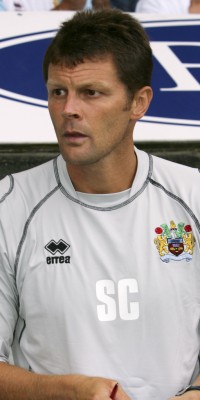|
Crisis Point
Last Updated : 16-Mar-2007 byIn the autumn, Steve Cotterill deserved credit for producing a side of honest players overflowing with belief and purpose, who had total confidence in themselves and their method. Now, roughly the same group of players are the shell of a team. Confidence is at rock bottom; the players no longer trust themselves to perform even the most basic tasks competently. Hardly surprising, really, when you think about it. After all, this team has failed to win a game in all the time I've been away.
Confidence is a priceless commodity, easy to come by in good times, yet bitterly hard to find when things are going badly. It takes a particularly strong character to retain faith in ones ability when all is going wrong - and by the looks of Tuesday night, only Steven Caldwell, signed halfway through this run, has that inner strength.
You cannot blame players for making honest mistakes borne of self-doubt. It isn't because they aren't trying, or because they don't care; it is because fear is a debilitating phenomenon. It isn't completely fair to blame the manager either: a great many managers have lost their jobs because the vicious circle of declining performances and evaporating confidence kicked in.
Steve Cotterill isn't telling his players now to hit long, straight balls every time they receive possession with an opposition player within five yards, any more than he was in October, when the likes of James O'Connor and Michael Duff were finding Claret shirts at will. Yet he cannot be spared criticism: after all, he signed these players whose strength of character is so fragile.
And I made the point in October, when Cotterill had his players stuffed full of self-belief, that the great managers are those who can inspire that belief in players to carry them to performances beyond their natural station. Not just, though, in good times when it comes easily - but also in darker times when it has to be coaxed out of players sceptical of their own abilities. I asked if Steve Cotterill had that quality, and perhaps the biggest concern right now is that the answer seems overwhelmingly negative.
Right now, the squad who performed so desperately poorly at Southend need injecting with a hefty dose of conviction. There is certainly ability there. I hadn't seen Caldwell play before, but he is clearly a very fine Championship centre-half. Joey Gudjonsson showed tenacity and a better touch than I anticipated, until a wild, foolish challenge barely 20 minutes in earned him a yellow card. He spent the rest of his evening rendered useless, not trusting himself to make another tackle for fear of a second card. For the most part, the rest of the team is comprised of players who played so well in the autumn.
Yet the flaws are all too obvious: the central midfield is so small it looks like two of the seven dwarfs are at work in the engine room; Chris McCann is no left winger; and our two strikers are hindered by both a total lack of form or fitness and a total lack of any semblance of understanding.
|
These questions, and many, many more must be asked in the summer. It is the ultimate catch-22: to trust the manager and back him further to allow him to complete his team-building before judging him; or to halt the experiment halfway, and find someone else to start again.
Arguably, should we stay up, Steve Cotterill deserves time. It is unfair to judge him on his first two seasons, when he was the first Burnley manager in 25 years to be required to sell players to balance the books. Certainly, since the re-emergence of the club in the early 90's, the sale of key players was never something that Stan Ternent, Jimmy Mullen or any other manager had to contend with. In the circumstances, upwards progress was never a reasonable expectation, and successive mid-table finishes represented solid achievement. The purse strings were only loosened in January: that is an awfully short period of time in which to judge his work.
Anyway, that can wait until the summer. It is too late now for a change, and there is a far more pressing agenda. That must involve changes from the ineffectual eleven fielded at Roots Hall. You could make a case for dropping any of the forward six from Tuesday night, and you might as well make wholesale changes, if only to shake things up a little.
Start by moving Chris McCann into the centre of midfield, where he at least provided the odd bit of craft after being shifted there in the second half. Perhaps even pair him with Eric Djemba-Djemba - you might as well make use of an international with Champions League experience if you have one. Kyle Lafferty might have wasted possession too often when given a run off the bench on Tuesday night, but even from an unfamiliar left wing position, he did provide a more direct threat to Southend than either Akinbiyi or the woefully unfit Gray. You might be even more radical, and ask Kyle to play as a lone striker, supported by John Spicer. It might be a tough ask for the young man, but he can't do any worse.
Of course, injuries in defence might lead to a makeshift outfit in any event. But this is a time for bold team selection, for shuffling the squad as far as it will stretch. The players who played on Tuesday night are shot to pieces, and one suspects those may no longer be the men to dig us out of a hole.
There is no doubting the truth; we are a team in freefall, from promotion pretenders to relegation contenders, and there is no more time to arrest the slump. It will take firm leadership to turn the ship around. That falls to one man. Mr Cotterill, your reputation lies firmly on the line.


